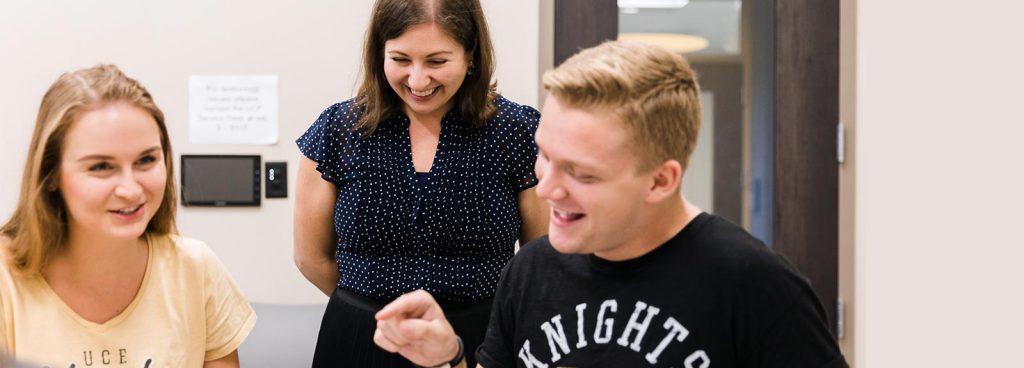Deadline for English MA in Technical Communication
- For Spring matriculation: November 1
- For Fall matriculation: February 1
- Please review “How to Apply” in the navigation for more information.
- Applicants applying by the priority deadline are given priority consideration for admission.
Overview of the Program
The Technical Communication track in the Master of Arts in English program is completely online and provides students with both theoretical and applied skills in such areas as technical writing and editing, visual design, usability, ethics, stylistics, computer documentation, and international communication.
Students in this program come from a variety of educational backgrounds such as psychology, computer science, business, and English. The program’s faculty members are well published in the field and have considerable experience in teaching online courses.
Our graduates hold a variety of jobs in the central Florida region; they have found work as technical writers, technical editors, information designers, web designers, corporate trainers, consultants, information developers, educators, instructional designers, documentation specialists, or have other communication-related jobs.
Overall, you will learn how to apply technical communication theory to projects that allow you to enhance your intellectual ability to analyze and solve problems on a rhetorical level. Also, these projects will serve as the material of a strong portfolio that will help you when you seek employment in the field.
There are some additional benefits that come from getting the UCF MA degree in Technical Communication:
- It could give you an edge on the job market. People who are hiring technical communicators will note on your résumé that you have a master’s degree and this will most likely stand out.
- Prepare you for a job interview because of what you have learned in the coursework.
- May be useful for a promotion or an increase in salary.
- Lets you teach at 2-year colleges.
- Can lead on to a Ph.D. program and can help you know whether you want to get a Ph.D.
You should also consider potential costs and trade-offs:
- Some employers will pay for your master’s degree while you work for them. If not, you will have to pay tuition (though financial aid may be available, just as it is for undergraduate degrees).
- Being a student may mean having a reduced salary during school and possible student loans due after you graduate.
- It’s a time commitment and you should think about how this might alter your work-life balance. Do you want to go back to school for a few years? Many students work full time while getting their MAs, but working and also going to grad school might keep you from doing other things in your life.
We recommend that you seek advice from others:
- Talk to a faculty member or mentor! Everyone’s situation is unique, and every job in technical communication is a bit different from all the other jobs in the field.
- If you have any questions about technical communication as a career, you can talk to some members of the local Central Florida chapter of the Society for Technical Communication (STC).
Strengths of the Program
- A long-standing connection to the Orlando Central Florida Chapter of the Society for Technical Communication (STC)
- A close working relationship with local companies and industries
- A location that provides students with access to a diverse array of industries
- A faculty with wide-ranging research interests and experience in teaching technical communication
Increase Your Employability
Our MA in Technical Communication program’s guiding philosophy is that technical communication is a field that focuses on communication about technical material. While the jobs that our students get after graduation are pretty variable, many of our graduates who work in technical (e.g., engineering or scientific) settings take on the role of a communications and writing expert on a technical team. Most–though not all–of our students come into the program with writing, rhetoric, or communications backgrounds, rather than technical backgrounds. We encourage our graduates to position themselves as subject matter experts in writing, who could potentially take on roles in different organizations in collaboration with technical subject matter experts. It can be helpful to get exposure to the types of technical or scientific communication you will be doing professionally during the MA (e.g., in an internship or independent study project). We encourage students to join the UCF Future Technical Communicators club, which provides networking, training, and internship opportunities in conjunction with industry professionals.
Graduates of the program are extremely successful finding jobs in the field. Graduates have been hired by a number of major corporations including
- Lockheed Martin
- Intel
- Amazon
- Harris Corporation
- Siemens Corporation
- Walt Disney World Company
Students are also employed by small software and engineering firms and by universities and nonprofit organizations.
The work for these graduates includes providing corporate training through e-learning, writing and designing online help systems, project management, communication and writing support for engineers, proposal writing, and consulting.
Enjoy the Flexibility of an Online Program
Because the program is completely online, students can create their own schedules. Many students work full-time jobs while they are enrolled in the program and are able to graduate in two years.
A number of students have completed the program without coming to campus at all. At the same time, faculty are readily available to meet with students who do come to campus.
Professional Development
Students have the opportunity to become active in the local chapter of the Society for Technical Communication. The Orlando Central Florida chapter holds monthly meetings; at these meetings students will have opportunities for pursuing professional development and networking.
